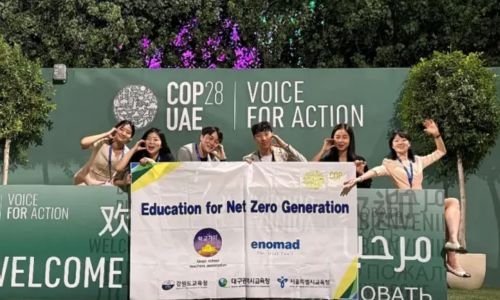Korea’s ‘Connecting the Dots’ and Belgium’s ‘EducoNetImpact’ win 2023 UNESCO King Hamad Prize for ICTs in Education
TDT | Manama
The Daily Tribune - www.newsofbahrain.com
“ Connecting the Dots: Data-Driven Carbon Literacy,” led by the GOGO School Teachers’ Association from the Republic of Korea, and “EducoNetImpact,” led by researchers at the University of Mons in Belgium, have won the 2023 UNESCO King Hamad Bin Isa Al-Khalifa Prize for the Use of Information and Communication Technologies (ICTs) in Education.
The award ceremony is scheduled for 2 September 2024 during UNESCO’s flagship Digital Learning Week at its Paris headquarters.
On this occasion, Dr. Mohammed bin Mubarak Juma, Minister of Education, extended congratulations to His Majesty King Hamad bin Isa Al Khalifa and His Royal Highness Prince Salman bin Hamad Al Khalifa, the Crown Prince and Prime Minister.
The 2023 edition of the UNESCO ICT in Education Prize aimed to explore the synergies between digital learning and greening education, two priority areas highlighted during the Transforming Education Summit in 2022.
Each of the two laureates will receive $25,000 for their work at the intersection of digital learning and greening education, harnessing technology to promote environmental and climate education while raising awareness about the environmental impact of digital technology.
Utilizing accessible digital tools, the carbon literacy project “Connecting the Dots: Data-Driven Carbon Literacy” engages students in collecting data on electricity consumption at home and school, documenting usage habits and patterns, and creating databases to track and analyze energy consumption.
Spanning four regions in the Republic of Korea and involving over 200 school students and 700 families, the project has improved students’ behaviours regarding electricity usage and increased awareness of climate change issues.
The “EducoNetImpact” project supports teachers in effectively teaching about digital technology and its impact on the environment.
Tested among 1,000 teachers with field experiments involving students, the project has demonstrated a positive impact on students’ awareness and behaviors, including adopting eco-responsible practices in the use of digital platforms and the recycling of digital devices.
An international jury reviewed 71 nominations submitted by 36 UNESCO Member States and three non-governmental organizations in official relations with UNESCO to select the two prize laureates.
Related Posts

